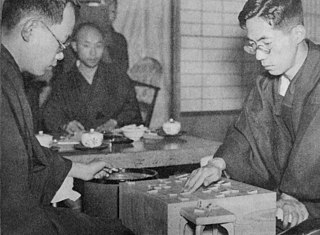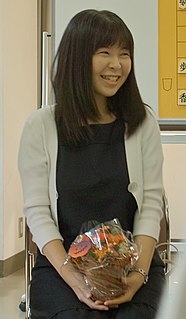Related Research Articles

The Nihon Ki-in (日本棋院), also known as the Japan Go Association, is the main organizational body for Go in Japan, overseeing Japan's professional system and issuing diplomas for amateur dan rankings. It is based in Tokyo. The other major Go association in Japan is Kansai Ki-in. Its innovations include the Oteai system of promotion, time limits in professional games, and the introduction of issuing diplomas to strong amateur players, to affirm their ranks.
Meijin (名人) means "Brilliant Man". It is the name of the second most prestigious Japanese Go Tournament. It also refers to a traditional Japanese title given to the strongest player of the day during the Edo period.

In the history of go in Japan, the four go houses were four major schools of go instituted, supported, and controlled by the state, at the beginning of the Tokugawa shogunate. At roughly the same time shogi was organised into three houses. Here "house" implies institution run on the recognised lines of the iemoto system common in all Japanese traditional arts. In particular the house head had, in three of the four cases, a name handed down: Inoue Inseki, Yasui Senkaku, Hayashi Monnyu. References to these names therefore mean to the contemporary head of house.

Hudson's Adventure Island is a side-scrolling platform game produced by Hudson Soft that was released in Japan for the Famicom and MSX on September 12, 1986. Adventure Island was released in North America for the Nintendo Entertainment System in September of 1988 and in the PAL region in 1992 under the title of Adventure Island Classic.
Cho Chikun25th HoninboHonorary Meijin is a professional Go player and a nephew of Cho Namchul. His total title tally of 75 titles is the most in the history of the Japanese Nihon Ki-in. Cho is the first player to hold the top three titles—Kisei, Meijin, and Honinbo—simultaneously which he did for three years in a row. Cho is the first in history to win all of the "Top 7" titles in Japan which he achieved by winning the Oza in 1994. Cho U in 2011 and Iyama Yuta in 2013 would duplicate this feat, both by winning the Kisei. He is also one of the 'Six Supers' Japanese players that were most celebrated in the late twentieth century, along with Rin Kaiho, Otake Hideo, Takemiya Masaki, Kato Masao and his classmate and arch-rival Kobayashi Koichi.
Cho U is a Taiwanese professional Go player. He currently ranks 6th in the most titles won by a Japanese professional; his NEC Cup win in 2011 put him past his teacher Rin Kaiho and Norimoto Yoda. Cho is the first player in history to have held five of the top seven major titles simultaneously with Iyama Yuta being the second. Cho U, Naoki Hane, Keigo Yamashita and Shinji Takao make up the group of players in Japan called the "Four Heavenly Kings". His wife is one of Japan's best female go professionals, Izumi Kobayashi, the great Kitani's granddaughter and daughter of Kobayashi Koichi.
Yuta Iyama Kisei, Honinbo, Meijin, Gosei is a Japanese professional Go player. In April 2016, he became the first player in Japanese history to hold all seven major titles simultaneously. In January 2018, Iyama became the first professional Go player to be awarded Japan's People's Honour Award.
The NEC Cup was a Go competition, supported by NEC Corporation between 1982 and 2012.
The Mingren is a Go competition in China organized by the Chinese Weiqi Association. The word míngrén means "brilliant man". The Mingren is equivalent to the Nihon-Kiin's Meijin and the Hanguk Kiwon's Myungin titles.

Yoshiharu Habu is a professional shogi player and a chess FIDE Master. He studied shogi under Tatsuya Futakami. He is the only person to simultaneously hold seven major professional shogi titles at the same time and is also the only person to qualify as a lifetime title holder for seven major titles. In January 2018, Habu became the first professional shogi player to be awarded Japan's People's Honour Award.
Naoko Hayashiba, who is also known by the pen name Masaru Katori, is a Japanese writer and manga author from Fukuoka. She had a successful career as professional shogi player but quit during a sex scandal with another professional player, Makoto Nakahara, in 1995. Since then, she has focused on writing and TV work. She has written two novel series, Tondemo Police and Kiss Dakeja Iya, and the manga Shion no Ō. In 2010, after a 15-year absence, she returned to shogi.

Meijin (名人) is one of the eight titles in Japanese professional shogi, and is the most prestigious title, along with Ryūō. The word meijin refers to a highly skilled master of a certain field.
This article details the history of shogi. Shogi is a two-player strategy board game in the same family as Western chess, chaturanga, and Chinese xiangqi, and is the most popular of a family of chess variants native to Japan.
Amahiko Satō is a Japanese professional shogi player, ranked 9-dan. He is a former Meijin title holder.

Kana Satomi is a Japanese women's professional shogi player ranked 6-dan. She is the current holder of the Women's Meijin and Ōi titles as well as the Kurashiki Tōka Cup and Seirei titles, thus making her a 4-crown title holder.

Sae Itō is a Japanese women's professional shogi player ranked 3-dan.
Ryōko Chiba is a Japanese women's professional shogi player ranked 4-dan. She is a two-time winner of the Women's Ōshō title.
The Eiō (叡王) is one of the eight major titles of professional shogi cosponsored by Dwango and the Japan Shogi Association (JSA). The tournament initially started out as a non-title tournament in 2015, but was upgraded to major title status in May 2017. The current Eiō title holder is Takuya Nagase.
References
| This Go-related article is a stub. You can help Wikipedia by expanding it. |